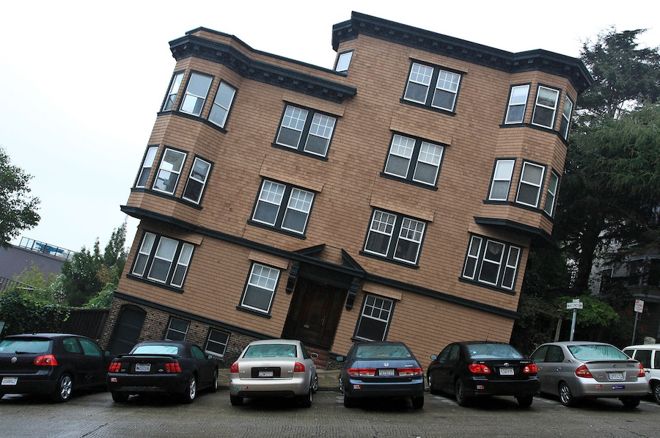No one drives in San Francisco better than my buddy Alex. He does not hesitate. If there’s a gap, he shoots it. If there’s a jam up, he skirts it. And when it comes to parking, Alex is the self-proclaimed King. He plays it smart, like he does at poker, weighing the risks and rewards of each action, isolating variables and narrowing their values, and coming up with the best play.
Here’s what you can expect if you go to a movie in San Francisco with Alex. You get in his car and drive two blocks and Alex swerves to the curb and slams to a stop in front of a hydrant, eight feet from a corner store. He’s back in seconds with a newspaper. You glance at the listings and agree on a movie. Trouble is, the movie starts in 15 minutes and the theater is 20 minutes away. But that’s okay because there’s 10 minutes of previews. The real problem—the thing that rates to make you late—is the parking.
You know that, on average, it takes 20 minutes to find street parking that is, on average, a ten-minute walk from the theater. That’s half an hour. Far too long. Or you can pay $10 to park in a garage that is three blocks from the theater. That play buys you ten minutes for ten bucks. But it’s still hopeless. No way you can make it to the theater in time. The right play is to fold.
“Let’s play some Scrabble and throw some Frisbee and go to a later showing,” you say. But it’s too late because you are already in Alex’s car and the thrusters are already engaged. Alex gears down for launch onto Oak Street, a four-lane heavily-populated-but-fast-moving one-way autoduct. Alex accelerates through a right-turn-on-red into a gap only three feet longer than his car. There’s a honk. Alex gestures. You put your seatbelt on.
Seven blocks from the theater, you both start scanning the streets for parking. When you get to the garage, you know it’s long odds against finding a closer, quicker place to park, so you suggest splitting the cost with Alex – five bucks each – we can make it if we walk really fast, and can we just get out of the car now, please?
Alex ignores you while he somehow wins a battle of nerves with a cable car. Then he makes a centripetally disorienting U-turn across five lanes on Van Ness. He reverse jerks against traffic for 10 lengths and slices into an illegal white-curb parking spot. The theater door is 30 feet away. You’ve got time for popcorn.
“Alex? Aren’t you worried about getting a parking ticket?”
Here’s where it gets confusing and beautiful. “This spot costs only $5,” Alex says, “half as much as the garage. Go ahead and give me the five bucks you were ready to pay for parking anyway, and you come out even.” He grins.
Baffled into obedience, you give Alex a five-dollar bill. Popcorn procured, you take your seat, just as the movie starts, and a huge wave of contentment puts all thoughts of parking on hold.
Movie over, out on the sidewalk, Alex instantly glances toward the car and says, “Cool. No parking ticket.”
“So what about my five bucks?” you say. “You gonna keep it?”
“Of course I am,” he says. “If there was a ticket, I would have paid the whole thing. See it? A parking ticket would have cost $25. The chance of getting a ticket in this spot for two hours is one-in-five. So it costs only $5, on average, to park there. Plus it was close enough that we could relax.”
You double-check your seat belt and think, “Relax?”
Alex continues, “Even if I had got a parking ticket, I would have theoretically parked for free because you paid the whole five bucks that this spot cost. I was getting a freeroll on a ten-to-one to five-to-one overlay – plus time gained!” His voice picks up as the car stabs the traffic, “I am… the king… of parking in San Francisco!”
Next time at the poker table, you see that all of your betting decisions are just like parking in The City with Alex. There are variables. For each event, some variables have absolute values and some don’t. The cost of the parking ticket was an absolute. The duration of the parking was an absolute. The time saved was an absolute. But the chance of getting a ticket—an essential variable in the parking equation—who can say what that was? Only someone with experience and savvy at the parking game.
Let’s say you’re on the river in a limit hold’em game and you have nothing and your opponent checks and you have to decide whether to bluff or not. The amount of money in the pot, that’s an absolute. The amount it costs to bluff, that’s an absolute. The likelihood that your opponent will fold? Knowing that is the secret to good parking.
Go ask Alex. I think he’ll know.
As my clients discover, less pain and more money go together. Coaching by Tommy


Add Comment